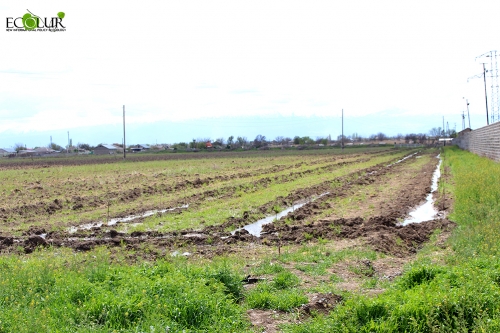

EcoLur
130 ha of cultivated land areas in Sayat-Nova Community have a problem with the irrigation water, as Sayat Nova Community residents informed EcoLur in the course of the meeting held in the community on 23 April. They mentioned that the problem with irrigation water has worsened because of the operation of fish farms.
Four fish farms operating in the community use 193.45 million cum water from the Ararat artesian basin developing 49 deep wells. These fish farms are owned by “Max Fish” (70.7 million cum/11 deep wells), “Golden Fish-K” LLC (66.06 million cum/20 deep wells), “Masis Dzuk” LLC (20.2 million cum water/7 deep wells) and “Bigama Fruit” Armenian-Russian Joint Initiative (20.2 million cum, 7 deep wells) see at: http://www.mnp.am/am/pages/187
At the meeting with EcoLur Sayat Nova Community Head Razmik Alaverdyan said, “We take the irrigation water from Hrazdan, while fish farm owners pay taxes to us: the community budget depends on that and these taxes help us to survive and run a kindergarten. We receive few subsidies and we can’t maintain a kindergarten so 70 children will remain in the street. Our annual taxes are 5 million, which is that little – what can we do with 5 millions? Nothing! I want to say if the fish farms are closed, we won’t be able to solve any problem.”
The community irrigation system is mainly served by Masis Division of “Yerevan” WUC through the water intake carried out via pumps from the Hrazdan River in a mechanical manner. The community gets rid of the irrigation water in case the pumps are broken down and there is no electricity.
The community head raised the issue of irrigation with the outlet water flowing out of fish farms. Since 2018 the irrigation of 60 ha land areas in Sayat-Nova community has been carried out with the outlet water of “Masis-Dzuk” fish farm from 7 points. This initiative has been funded by the UNDP 'Advanced Science & Partnerships for Integrated Resource Development (ASPIRED) Project', the Fund for Armenian Relief, and the Small and Medium Entrepreneurship Development National Center of Armenia (SME DNC).
According to community Head Razmik Alaverdyan, a pipeline 1200 m long has been constructed within the project, which supplied water to 60 ha. The problem is that a pipeline with the length of 1200 meters and a diameter of 400 mm needs to be constructed to supply irrigation water to the area of 190 ha.
The letter addressed to EcoLur signed by the community head says,
“We would like to inform that a water pipeline has been constructed in the community to use the outlet water of the fish farms in the agriculture within the frames of the UNDP 'Advanced Science & Partnerships for Integrated Resource Development (ASPIRED) Project' (hereinafter the ASPIRE project). In the frames of the ASPIRE project, only 1200 meters of pipeline has been constructed because of the lack of funds, which irrigates 60 ha of land areas. The spent amount makes up 56,705,200 AMD (fifty six million seven hundred and five thousand two hundred). The community has obtained a substation at its own expended and carried out all soil works: the money spent by the community makes up 5,000,000 (five million) AMD.
Our request is to continue the construction of the water pipeline, for which a pipeline with the length of 1200 meters and a diameter of 400 mm is needed with the total value of around 25 million (twenty five million) AMD. All the related land works will be implemented by the community. Sayat Nova Community has also a problem with drinking water – the intracommunity network of the drinking water urgently needs repairing. The leak of the wastewater into the network of the drinking water can cause infectious diseases. According to Sayat-Nova Development Program for 2017-2020, 300 million is required to recover the intracommunity network of the drinking water. Currently, not all houses have tap drinking water so take water either from the neighbours or from Masis.”
.jpg)
This publication has been prepared within the frames of “Protect Your Right to Water” project with the support of the American people through the United States Agency for International Development (USAID), whereas the opinions expressed or the content of the publications don’t necessarily represent the official views and opinions of USAID.
May 17, 2019 at 17:55
